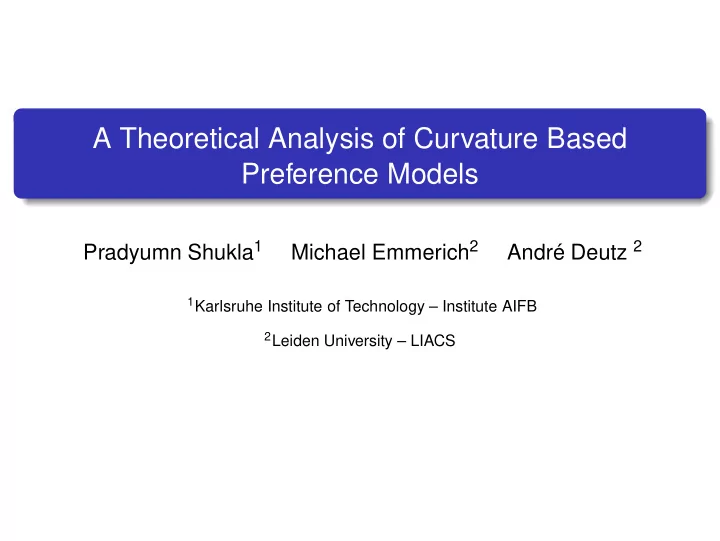

A Theoretical Analysis of Curvature Based Preference Models Pradyumn Shukla 1 Michael Emmerich 2 André Deutz 2 1 Karlsruhe Institute of Technology – Institute AIFB 2 Leiden University – LIACS
Multi-objective Optimization Problem Given m , n ∈ N such that m ≥ 2, a multi-objective optimization problem (MOP) is a 3-tuple ( F , X , C ) such that F ( x ) := ( F 1 ( x ) , F 2 ( x ) , . . . , F m ( x )) is a vector valued objective function X ⊆ R n a feasible set C is a cone (set) that induces a partial ordering on R m Pradyumn Shukla, Michael Emmerich, André Deutz A Theoretical Analysis of Curvature Based Preference Models
An Optimality Notion Definition A point ˆ x ∈ X is C -optimal if ( { F (ˆ x ) } − C ) ∩ F ( X ) = { F (ˆ x ) } . F 2 ( x ) A F (ˆ x ) −C B F 1 ( x ) Image of C -optimal points of a bicritetia problem Pradyumn Shukla, Michael Emmerich, André Deutz A Theoretical Analysis of Curvature Based Preference Models
Preference Models Let X p ( F , X , C ) be the set of C -optimal optimal points. Definition A preferred solution set, denoted by X P ( F , X ) , is a proper subset of X p ( F , X , R m + ) . The set X P ( F , X ) is said to be induced by a preference model P . Pradyumn Shukla, Michael Emmerich, André Deutz A Theoretical Analysis of Curvature Based Preference Models
Characteristics of Preference Models Domination transformation: A (convex) cone C ⊃ R m + exists such that X P ( F , X ) = X p ( F , X , C ) Objective transformation: A function T : R m → R k exists such that X P ( F , X ) = X p ( T ◦ F , X , R m + ) Lemma If T := A , where A is a m by k matrix, then the above two transformations are equivalent and, C is the polyhedral cone { d ∈ R m | Ad ≥ 0 } . In general, these do not imply each other. Pradyumn Shukla, Michael Emmerich, André Deutz A Theoretical Analysis of Curvature Based Preference Models
A Polyhedral Model 1.2 1 0.8 0.6 0.4 0.2 0 1 1.5 0 1 0.5 −1 0 −2 −0.5 A polyhedral domination cone. The k can be much larger than m . Some real world applications use k = m ( m − 1 ) . Pradyumn Shukla, Michael Emmerich, André Deutz A Theoretical Analysis of Curvature Based Preference Models
� A Piecewise Polyhedral Model � � ��� æ ö 0 1 = ç ÷ A ç ÷ 1 1 1 è ø æ 1 0 ö = ç ÷ A ç ÷ 2 1 1 è ø � ��� Piecewise polyhedral transformations of the objectives in the case of equitable efficiency. There are m ! polyhedral transformation for an m -objective problem. Pradyumn Shukla, Michael Emmerich, André Deutz A Theoretical Analysis of Curvature Based Preference Models
An Algorithm Algorithm: General cone-based hypervolume computation Input: An m by k matrix A , points S ⊂ R m , and a reference point r Let r ′ = A r . 1 For all i = 1 , . . . , | S | , let Q = { q ( 1 ) , . . . , q | S | } , with q ( i ) = A s ( i ) . 2 Compute the standard hypervolume HI ( Q , r ′ ) . 3 Return CHI ( S ) = ( 1 / det ( A ⊤ A )) · HI ( Q , r ′ ) . 4 Pradyumn Shukla, Michael Emmerich, André Deutz A Theoretical Analysis of Curvature Based Preference Models
An Application in Equitable Efficiency 0.52 Distribution of 30 points in original space, for problem ZDT1 0.5 0.48 0.46 F 2 0.44 0.42 0.4 0.38 0.24 0.26 0.28 0.3 0.32 0.34 0.36 0.38 0.4 0.42 F 1 Distribution of points in the original ZDT1 objective space Pradyumn Shukla, Michael Emmerich, André Deutz A Theoretical Analysis of Curvature Based Preference Models
An Application in Equitable Efficiency 0.765 Distribution of 30 points in transformed space, for problem ZDT1 0.76 T 2 (F) 0.755 0.75 0.38 0.4 0.42 0.44 0.46 0.48 0.5 0.52 T 1 (F) Distribution of points in the transformed ZDT1 objective space Pradyumn Shukla, Michael Emmerich, André Deutz A Theoretical Analysis of Curvature Based Preference Models
Summary Analyzed various preference models Presented new theoretical results Pradyumn Shukla, Michael Emmerich, André Deutz A Theoretical Analysis of Curvature Based Preference Models
Summary Analyzed various preference models Presented new theoretical results Proposed an algorithm to compute general cone based hypervolume Applied on a piecewise polyhedral preference model Pradyumn Shukla, Michael Emmerich, André Deutz A Theoretical Analysis of Curvature Based Preference Models
Summary Analyzed various preference models Presented new theoretical results Proposed an algorithm to compute general cone based hypervolume Applied on a piecewise polyhedral preference model Many other details in the paper Pradyumn Shukla, Michael Emmerich, André Deutz A Theoretical Analysis of Curvature Based Preference Models
Recommend
More recommend